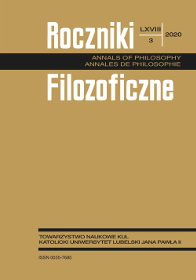Divine Providence and Chance in the World: Replies
Abstract
In the paper, I reply to the objections contained in the other papers in this issue raised against my conception of providence and chance presented in the opening article and the book from 2014. I argue that the existence of variously understood random events (chance) does not imply the thesis that God, the Creator of the world is not interested in the fate of individual creatures, including human beings. The reason why God can permit random events to occur is God’s will to create a relatively autonomous world that has the ability to self-develop and self-create. In such a world, there may be pointless evil for which God is not directly responsible.
References
Bertalanffy, Ludwig von. 1968. General System Theory. New York: George Braziller.
Bertalanffy, Ludwig von. 1975. Perspectives on General Systems Theory: Scientific-Philosophical Studies. Edited by Edgar Taschdjian. New York: George Braziller.
Craig, William Lane. 1987. The Only Wise God. Grand Rapids: Baker Book House.
Flint, Thomas P. 2020. “Providence, Chance, Divine Causation, and Molinism: A Reply to Łukasiewicz.” Roczniki Filozoficzne 68 (3): 55–69.
Forrest, Peter. 2020. “Chance or Agency? A Response to ‘Divine Providence and Chance in the World’.” Roczniki Filozoficzne 68 (3): 111–25.
Gębura, Błażej. 2020. “On Epistemology of Chance.” Roczniki Filozoficzne 68 (3): 221–32.
Grabowski, M. 2020. “Is Probabilistic Theism a Tenable Idea? Critical Remarks on Opatrzność Boża, wolność, przypadek.” Roczniki Filozoficzne 68 (3): 205–20.
Guillon, Jean-Baptiste. 2020. “Divine Providence: Fine-Grained, Coarse-Grained, or Something in Between?” Roczniki Filozoficzne 68 (3): 71–109.
Hasker, William. 1989. God, Time, and Knowledge. Ithaca, NY–London: Cornell University Press.
Hasker, William. 2000. “A Refutation of Middle Knowledge.” In Middle Knowledge Theory and Applications, edited by William Hasker, David Basinger, and Eef Dekker, 66–77. Frankfurt am Main–New York: Peter Lang.
Hasker, William. 2008. The Triumph of God over Evil. Theodicy for a World of Suffering. Downers Grove, IL: Inter Varsity Press.
Hasker, William. 2020. “How to Make a World.” Roczniki Filozoficzne 68 (3): 35–54.
Heller, Michał. 2014. Sens życia i sens wszechświata. Kraków: Copernicus Center Press.
Judycki, Stanisław. 2020. “God’s Insurmountable Will and the Mystery of the Freedom of Created Beings: Comments on the book Opatrzność Boża, wolność, przypadek by Dariusz Łukasiewicz.” Roczniki Filozoficzne 68 (3): 137–47.
Kleszcz, Ryszard. 2020. “Chance and Divine Providence: Methodological Notes with Pascal in the Background.” Roczniki Filozoficzne 68 (3): 169–85.
Kopersky, Jeffrey. 2020. “Divine Action and the Laws of Nature: A Reply to Łukasiewicz.” Roczniki Filozoficzne 68 (3): 127–36.
Laszlo, Ervin. 1972a. Introduction to Systems Philosophy. New York: Gordon and Breach.
Laszlo, Ervin. 1972b. The Systems View of the World: The Natural Philosophy of the New Developments in the Sciences. New York: George Braziller.
Łukasiewicz, Dariusz. 2014. Opatrzność Boża, wolność, przypadek. Studium z analitycznej filozofii religii. Poznań: W drodze.
Łukasiewicz, Dariusz. 2020. “Divine Providence and Chance in the World.” Roczniki Filozoficzne 68 (3): 5–34.
Łukasiewicz, Elżbieta. 2006. “What Kind of System is Language? On the Relevance of General Systems Theory to Language Studies.” Scripta Neophilologica Posnaniensia 8: 97–113.
Łukasiewicz, Elżbieta. 2008. “Czy język to projekt doskonały? Zasada ekonomii w strukturze języka i założeniach programu minimalistycznego.” Filozofia Nauki 16 (1): 27–40.
Mordarski, Ryszard. 2020. “Probabilistic Theism and the Classical Doctrine of Actus Purus. Roczniki Filozoficzne 68 (3): 187–203.
Plantinga, Alvin. 2011. Where the Conflict Really Lies: Science, Religion and Naturalism. Oxford: Oxford University Press.
Rogers, Katherin A. 2008. Anselm on Freedom. Oxford: Oxford University Press.
Swinburne, Richard. 1993. The Coherence of Theism. Oxford: Oxford University Press.
Wojtysiak, Jacek. 2020. “God and Chance.” Roczniki Filozoficzne 68 (3): 233–47.
Vallicella, William F. 2010. “Divine Simplicity.” The Stanford Encyclopedia of Philosophy (Fall 2010), edited by Edward N. Zalta. http://plato.stanford.edu/archives/fall2010/entries/divinesimplicity.
Van Inwagen, Peter. 1988. “The Place of Chance in a World Sustained by God.” In Divine and Human Action: Essays in the Metaphysics of Theism, edited by Thomas V. Morris, 211–35. Ithaca, NY: Cornell University Press.
Ziemiński, Ireneusz. 2011. “Argumenty za istnieniem Boga.” In Przewodnik po metafizyce, edited by Sebastian T. Kołodziejczyk, 549–92. Kraków: Wydawnictwo WAM.
Ziemiński, Ireneusz. 2020. “Is God (Perfectly) Good? Remarks on Opatrzność Boża, wolność, przypadek by Dariusz Łukasiewicz. Roczniki Filozoficzne 68 (3): 147–67.
Copyright (c) 2020 Roczniki Filozoficzne

This work is licensed under a Creative Commons Attribution-NonCommercial-NoDerivatives 4.0 International License.





